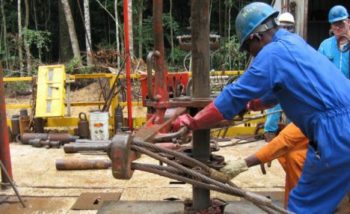
Nigeria’s oil rig count slightly increased to 26 in February, from the 25 recorded in January, this year, Baker Hughes Incorporated and the Organisation of Petroleum Exporting Countries (OPEC ), secretariat data shows.
But the nation remains number eight out of the 13 – member OPEC, whose total rig count also slightly increased to 554, from the 550 recorded in January.
The data showed that Nigeria’s rig count still falls below the 30 recorded about this time in 2015 and 34 recorded in 2014.
Among OPEC members, Saudi Arabia led with a rig count of 155, followed by Venezuela, 96, Iran, 61, Kuwait, 59, Algeria, 50, United Arab Emirate, 49, Iraq, 40, Qatar, 11, Ecuador, 7, Angola, 3, Libya, 1, Gabon, 0.
Africa’s non OPEC members still maintained the 16 rig count it recorded in January.
“Regulatory uncertainty has resulted in fewer investments in new oil and natural gas projects, and no licensing round has occurred since 2007.The amount of money that Nigeria loses every year from not passing the PIB is estimated to be as high as $15bn,” the United States Energy Information Administration said in its ‘Nigeria Brief’.
It indicated that Nigeria has the second-largest amount of proven crude oil reserves in Africa, but exploration activity has slowed. Rising security problems, coupled with regulatory uncertainty, have contributed to decreased exploration,” the EIA said.
According to the agency, the Petroleum Industry Bill (PIB), which was initially proposed in 2008, is expected to change the organisational structure and fiscal terms governing the oil and natural gas industry if it becomes law. “International oil companies are concerned that proposed changes to fiscal terms may make some projects commercially unviable, particularly deepwater projects that involve greater capital spending,” it stated.
The Minister of State for Petroleum Resources, Dr. Ibe Kachikwu, had recently said the agreement by OPEC and non-OPEC producers to cut production with a view to stabilising prices was already yielding results for Nigeria.
He said higher oil prices and a long-term plan for production were spearheading the country’s efforts to get its oil and gas sector back on track.
Kachikwu explained that tackling militancy in the Niger Delta communities was a high priority for the government, which would produce far-reaching benefits.
“We can already see that our efforts to create a more enabling environment and increase stability are producing positive responses from investors,” he said.
Also speaking on the issue, the Chief Executive Officer of Tecon Oil Services, Casmir Maduafokwa, said that the vital measurement of the level of activity in the oil sector is the level of rig activity.
“The rig count has been shrinking. In the period 1990 to 1991, the rig count was close to 50. The current rig count is below 30. We have a lot of stacked rigs. We also have four workover units stashed. Even with no income, you have to maintain them.
“There are lots of idle rigs in the market. The rig activity normally drives a lot of other activities. If you pull a rig out of the system, all these services basically dry up. The oil companies are even smart. They have call-off provisions. You can invest and if there is no work, you are not paid a dime. The point is that the oil sector especially the joint venture aspect has performed poorly,” he added.
